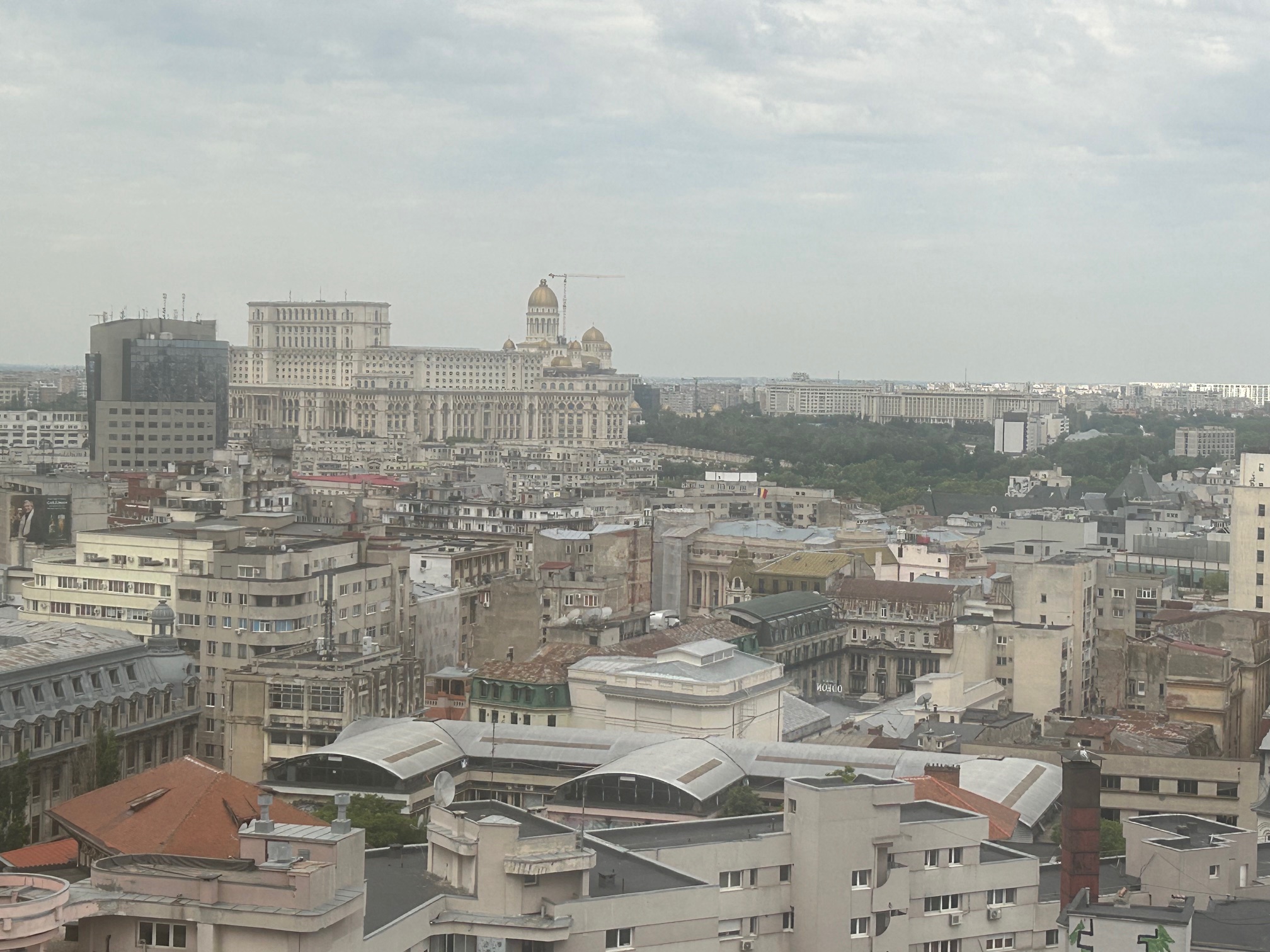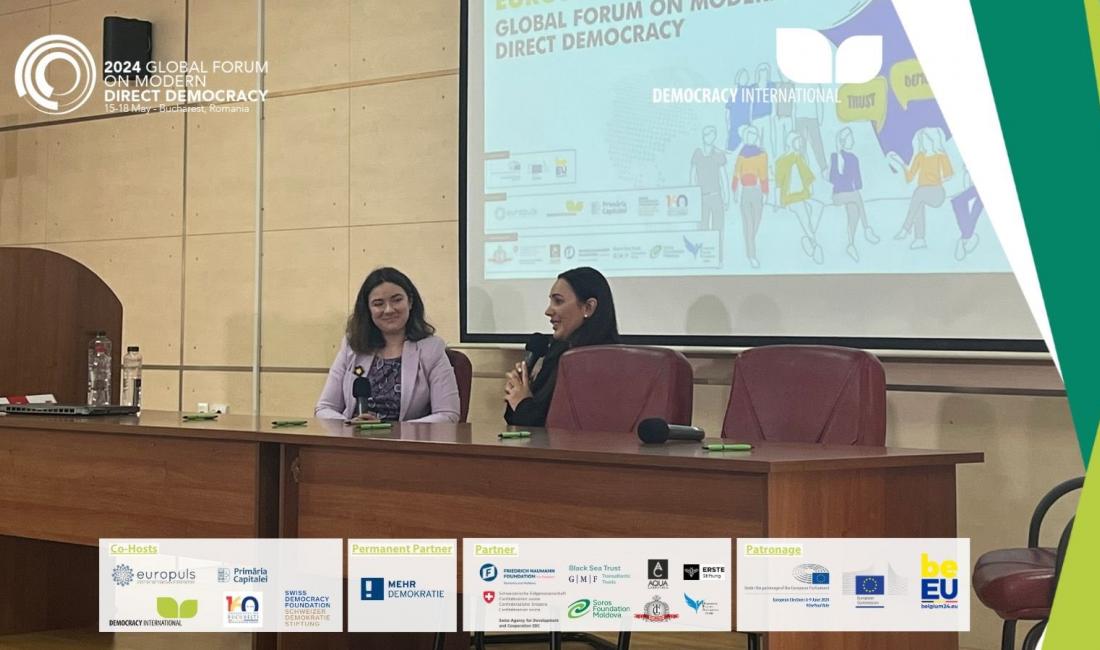Assessing your own local democracy. 'Evil Does Not Exist' Outside Tokyo. A Caution from Bratislava. Bono for Dublin.
This is the latest edition of Democracy Local's monthly newsletter. You can subscribe to the newsletter for free here. To pitch stories, propose partnerships, or donate, please contact me directly at joe@democracylocal.com. (Photo credit: Democracy International and 2024 Global Forum on Modern Direct Democracy)
IN BUCHAREST, ‘LOCAL DEMOCRACY IS FREEDOM’
It was wonderful to meet so many Democracy Local readers in Bucharest, Romania, at the 2024 Global Forum on Modern Direct Democracy.
Local democracy was a big topic at the free, public event in May. Innovations in democratic participation, from Sao Paulo to Stockholm, were discussed. A debate between candidates for the European Parliament focused on decentralization of European Union funding.
On the closing day of the forum, the panel “Mayors for Democracy” brought together local leaders from Moldova and Romania. They emphasized how local democracy creates accountability, with the people most affected by decisions also taking those decisions.
“If I had to describe local democracy in one word, it’s freedom,” declared Corina Ene, mayor of Căbești, Romania. (Romanian speakers can watch the event, on the Global Forum’s last day, at Youtube—with the mayors beginning to talk at 2:58:00)
ALSO NEW IN BUCHAREST
The Global Forum saw the release of the first ever State of Direct Democracy report. You can read it here.
OUR #DEMOCRACYLOCAL.
Debuting at Democracy Local, and on social media channels, is a new visual feature, Our #DemocracyLocal that asks people around the world about the best example of local democracy from their experiences.
In the debut, check out Erwin Mayer’s short account of a citizens assembly on land use in his small Austrian town. And for more context on why citizens assemblies are succeeding in Austria, check out this piece from Democracy Next.
BONO FOR MAYOR OF DUBLIN
Dublin doesn’t elect its mayors. Nor do other Irish cities. That lack of elected leadership is part of an Ireland that has some of the weakest local governments in Europe. (Only Hungary and Russia rank lower in an index of “local autonomy.”)
That’s why, in the Democracy Column, I suggested that U2 frontman Bono return to his hometown of Dublin to run for mayor. First, he’d have to pressure the Irish government to make mayors elected, and restore more power to local government. It’s a tough task—which makes Bono perfect, because the centralized Irish government can’t ignore him.
HOW TO ASSESS YOUR OWN LOCAL DEMOCRACY
I’ll be writing more in the near future about the treasure trove of information contained with International IDEA’s new publication, “State of Local Democracy Assessment.” In the meantime, people everywhere should check out the framework, which outlines a “two-dimensional process” combining “research with inclusive dialogue and debate” for you to assess the state of local democracy in your own community.
HOW BRATISLAVA EXTENDS DEMOCRACY, WHILE SLOVAKIA FALLS INTO POLITICAL CHAOS.
You may be reading stories about political chaos and anti-democratic repression in Slovakia, especially since the attempted assassination of the country’s authoritarian prime minister. But the picture is too bleak.
Bratislava, Slovakia’s greatest city, is advancing democracy.
Indeed, Bratislava was one of five finalists to be the European Capital of Democracy for 2024-25 (It was beaten out by close neighbor, Vienna). Reading Bratislava’s submission for that contest is instructive. Bratislava has built programs and systems for bringing more people, especially children, into local democracy, in service of making the city a place of trust.
Does this surprise you? It shouldn’t. It’s become commonplace to see democratic backsliding at the national level despite democratic gains at the local level.
OMISSION
The Alliance of Democracies' new survey on global perceptions of democracy has drawn media coverage for its findings on people’s frustrations with democracy, but the survey has a huge hole in its heart. I searched the report in vain for any mention at all of local democracy.
It’s bizarre to survey people on democracy without asking about their perception of the level of government at which they are most likely to participate in democracy.
WATCHING
I highly recommend the masterful, deliberative-democracy-themed Japanese film, “Evil Does Not Exist” from director Ryusuke Hamaguchi (“Drive My Car”). The story is a thriller about a small town outside Tokyo where developers and residents clash about a proposed glamping resort. The exchanges between developers and locals—including a community meeting that is the movie’s longest scene—should be fascinating to anyone interested in democracy, local governance, or human relations. The film remains in theaters in some country, and on Apple TV and some other streamers worldwide.
GAMING
Organizers of the Truth Lies Democracy gaming contest in Barcelona have put the democracy-oriented online games available for you to play here. As a working journalist, I found it noteworthy that the games involve producing information or misinformation.
READINGS
If your proposal is unpopular, should you withdraw it? A new study looked at local government proposals to close schools in Sweden over the first two decades of this century. School closures are unpopular, the study found. But what stands out is the study’s finding that the incumbent party also lost support—an average of one percentage point—when it withdrew a proposal to close a school and instead kept the campus open. Yes, sometimes, you’re damned if you do, and damned if you don’t.
Also: How do you build a “happy city”? A diverse team of researchers in Malaysia has answers.
DEMOCRACY QUOTE OF THE MONTH
“Democracy is our religion. Let's practice it.”
Barcelona Deputy Mayor Maria Eugenia Gay at the inaugural ALDA Festival on local democracy in her city, May 13.
Photo credit: Joe Mathews





